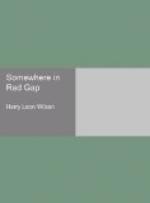“Go on; what about that next time?”
“You know already,” said Pete firmly.
“You tell, too.”
He pondered this, his keen little eyes searching my face as he pensively fondled the axe.
“You know about this time that son-of-gun go ‘n’ kill a bright lawyer in Red Gap? I think that cap the climax!”
“Certainly, I know!” This with bored impatience.
“I think, then, you tell me.” His seamed face was radiant with cunning.
“What’s the use? You know it already.”
He countered swiftly:
“What’s use I tell you—you know already.”
I yawned again flagrantly.
“Now you tell in your own way how this trouble first begin,” persisted Pete rather astonishingly. He seemed to quote from memory.
Once more I yawned, turning coldly away.
“You tell in your own words,” he was again gently urging; but on the instant his axe began to rain blows upon the log at his feet.
Sounds of honest toil were once more to be heard in the wood lot; and, though I could not hear the other, I surmised that the sledge of Uncle Abner now rang merrily upon his anvil. Both he and Pete had doubtless noted at the same moment the approach of Mrs. Lysander John Pettengill, who was spurring her jaded roan up the long rise from the creek bottom.
* * * * *
My stalwart hostess, entirely masculine to the eye from a little distance, strode up from the corral, waved a quirt at me in greeting, indicated by another gesture that she was dusty and tired, and vanished briskly within the ranch house. Half an hour later she joined me in the living-room, where I had trifled with ancient magazines and stock journals on the big table. Laced boots, riding breeches, and army shirt had gone for a polychrome and trailing tea gown, black satin slippers, flashing rhinestone rosettes, and silk stockings of a sinful scarlet. She wore a lace boudoir cap, plenteously beribboned, and her sunburned nose had been lavishly powdered. She looked now merely like an indulged matron whose most poignant worry would be a sick Pomeranian or overnight losses at bridge. She wished to know whether I would have tea with her. I would.
Tea consisted of bottled beer from the spring house, half a ham, and a loaf of bread. It should be said that her behaviour toward these dainties, when they had been assembled, made her seem much less the worn social leader. There was practically no talk for ten active minutes. A high-geared camera would have caught everything of value in the scene. It was only as I decanted a second bottle of beer for the woman that she seemed to regain consciousness of her surroundings. The spirit of her first attack upon the food had waned. She did fashion another sandwich of a rugged pattern, but there was a hint of the dilettante in her work.
And now she spoke. Her gaze upon the magazines of yesteryear massed at the lower end of the table, she declared they must all be scrapped, because they too painfully reminded her of a dentist’s waiting-room. She wondered if there mustn’t be a law against a dentist having in his possession a magazine less than ten years old. She suspected as much.




